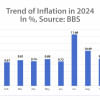When can we stop worrying about rising prices?

Tired of thinking about inflation's impact on your wallet? You're not alone. But like it or not, higher prices continue to be an economic and – with the presidential race – a political issue as we enter the early months of 2024.
The Conversation asked two financial economists, D. Brian Blank at Mississippi State University and Appalachian State University's Brandy Hadley, what they make of the inflation report that dropped on Jan. 11, 2024, and whether there might be a time before too long when we can all stop worrying about increasing costs.
Was inflation higher or lower in December 2023?
Both, unfortunately.
Economists have many ways of measuring how prices change over time. Two key measures are overall, or "headline," inflation, which tracks the prices for a basket of goods and services, and "core" inflation, which tracks many of the same items but excludes those with unusually jumpy prices, such as gasoline.
Analysis of the world, from experts
In the Bureau of Labor Statistics' Jan. 11 report, which measured how much prices changed in December 2023, these indicators moved in different directions. In other words, the higher one, core CPI – short for consumer price index – declined from an annual rate of 4 percent in November to 3.9 percent in December. And the lower one, headline inflation, rose from 3.1 percent to 3.4 percent.
While previously falling prices for clothing, alcohol, new vehicles and gas reversed course in December, core inflation finally fell below 4.0 percent.
But what does all this inflation confusion mean?
What everyone wants to know is when will inflation go back to normal, or at least closer to the Federal Reserve's target of 2 percent. And while no one knows the answer, there are reasons to believe it may happen soon.
At this point, people should be less worried about inflation than they were in December 2022, when the headline figure was 6.4 percent.
While inflation is still higher than we have gotten used to over the past decade, it's much lower than it has been over the past couple of years.
Hopefully, that indicates the Federal Reserve is approaching the end of its battle with inflation and may be able to finally lower interest rates later this year.
Over the past two years, the central bank has raised rates 11 times to tame consumer demand and prices.
But concerns remain about inflation persisting. One risk factor is the impact that conflicts in Ukraine and now the Middle East will have on trade routes, such as those in the Red Sea.
Another area of concern may be home prices, which builder KB Homes reports may be rising more this year.
Those worries could lead the Fed to wait just a bit longer to make any big decisions on whether to ease off the brakes any time soon.
So why did headline inflation tick higher?
Overall inflation came in higher than forecasts largely due to the rising price of housing.
Rent accounts for a huge part of inflation, since it's one of many people's largest expenses. However, CPI is calculated using rental data over the past year, which means the data lags behind real-time rent changes.
What's more, real estate marketplace Zillow's estimates of rent are falling – a trend that's expected to continue as more apartments are built this year.
What matters to people: Prices or inflation?
Even though inflation is slowing, costs are 18 percent higher than four years ago and aren't falling, which makes many people less optimistic about the economy than before the pandemic.
Some Wall Street forecasters and economists struggle to understand people's concerns when labour markets are strong and the stock market is rising.
Still, consumer prices are near all-time highs, which is neither exciting for most people nor surprising to economists given that prices typically rise over time.
Despite high expenses, people still have a degree of disposable income. The cost to eat out continues to increase three times as fast as the cost to eat at home, which is both one of the largest differences on record and evidence that people still have income to spend eating out.
That shows the mismatch between consumer behaviour and "vibes": Americans have the money to travel and go to restaurants, but still complain about airfare and menu prices.
When can we stop talking about inflation?
We may have to wait until people stop feeling the inflation impacts before they stop wanting to complain about it – and focus on it – each month.
Could the Fed stop the inflation preoccupation by lowering rates? Or does the Fed need to hold rates higher for longer? Only time will tell.
The story was originally published on the website of The Conversation on January 11 this year.

 For all latest news, follow The Daily Star's Google News channel.
For all latest news, follow The Daily Star's Google News channel. 








Comments